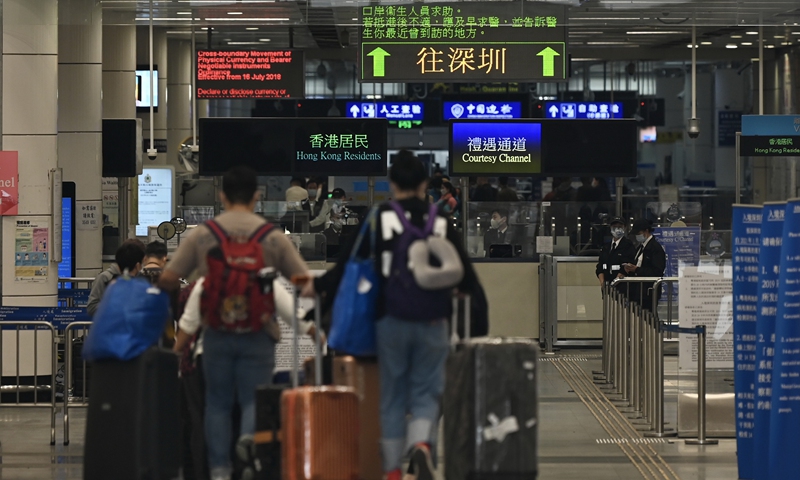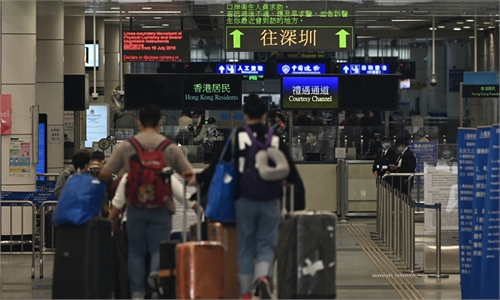
A file photo shows that travelers pass through a land port connecting Hong Kong and Shenzhen, South China's Guangdong Province. Photo: IC
Chief Executive of Hong Kong Special Administrative Region (HKSAR) has announced plans to reopen the border with the Chinese mainland before January 15 next year. Hong Kong society is rolling up its sleeves for the reopening after the border was closed for three years.
Customs is testing procedures, while travel agencies, railway operators and airlines that link the mainland and Hong Kong are adding capacity and inspecting their vehicles. The tourist industry has already received a tsunami of orders and enquiries from the mainland.
The decision to reopen the border was announced by John Lee, HKSAR Chief Executive on Wednesday. He said the government will drop compulsory COVID-19 tests for arrivals from the mainland, Macao and foreign countries as of Thursday, and dropped implementation of the Vaccine Pass and social distancing measures.
The mask mandate is still in place.
Lee said that relaxing COVID-19 controls was done as the city already has a high vaccination rate, and a herd immunity barrier had been built as more than 2.5 million of the city's 7.5 million population were infected. Moreover, Hong Kong's medical system accumulated abundant experience with COVID-19 infections, and is shifting its focus on preventing severe cases and deaths.
Lee said that the SAR government may impose quotas for passengers from Hong Kong to the mainland at the beginning of the border opening.
Hong Kong's decision to end most COVID-19 controls came after the mainland announced on Tuesday that entries to the mainland won't be subject to compulsory quarantine starting from January 8, and only 48-hour negative tests were needed.
Although the exact date was not decided and further details are still to be announced, Hong Kong society is excited about the move.
Hong Kong's customs department said that it has deployed employees who were transferred to other departments when ports to the mainland were closed, back to their posts. To prepare for the border reopening, the department is testing its software and other facilities, training employees and holding drills of customs clearances.
An official from the customs department said that the department will advise mainland travelers not to bring excessive medicines such as painkillers, as the surging number of infections in the mainland has caused temporary shortages of medicines such as ibuprofen and pills for flu treatment.
Hong Kong media reported on Wednesday that as the government revealed that the border would soon be reopened, appointments for Hong Kong residents applying for documents to travel to the Chinese mainland were fully booked in recent days. Some centers for such applications will only take bookings for next month.
Timothy Chui, director of the Hong Kong Tourism Association, told the Global Times on Wednesday that there is ample need for Hong Kong residents to travel to the mainland, and his association has already received many requests.
Chui pointed out that as one of the pillars of the city's economy, tourism took a heavy blow during the pandemic. Jobs in tourism industries were lost, and tourism buses "grew mold."
Mainland residents' need to reach Hong Kong is also surging. After the mainland announced plans to drop quarantine requirements for arrivals, searches for international tickets increased fivefold within one hour, with Hong Kong, among other Asian cities, topping the search list.
A travel agency owner surnamed Lo in Hong Kong told the Global Times that he is hiring tour guides and other employees due to booming enquiries from the mainland.
Chui said that if transportation capacity allows, tour groups from the mainland to Hong Kong are likely to resume before the Chinese New Year, which falls on January 22, 2023.
"I really hope that the border will open as soon as possible, and free travel will be resumed, so that compatriots from the mainland will come to Hong Kong to boost our tourism industry. Let us have a new start," said Chui.


